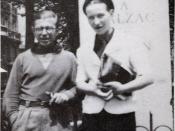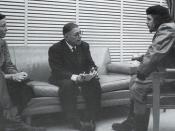Sartre is arguably the best known philosopher of the twentieth century. His unfaltering pursuit of philosophical reflection, literary creativity, and, in the second half of his life, active political commitment gained him worldwide renown, if not an admiration. He is commonly considered the father of Existentialist philosophy, whose writings set the tone for intellectual life in the decade immediately following the Second World War. Among the many ironies that permeate his life, not the least is the immense popularity of his scandalous public lecture "Existentialism and Humanism," delivered to an enthusiastic Parisian crowd October 28, 1945. Though taken as a quasi manifesto for the Existentialist movement, the transcript of this lecture was the only publication that Sartre openly regretted seeing in print. And yet it continues to be the major introduction to his philosophy for the general public. One of the reasons both for its popularity and for his discomfort is the clarity with which it exhibits the major tenets of existentialist thought while revealing Sartre's attempt to broaden its social application in response to his Communist and Catholic critics.
In other words, it offers us a glimpse of Sartre's thought "on the wing."
Sartre's Early Years
June 21, 1905 was the day when Jean-Paul-Charles-Aymard Sartre was born on 13, rue Mignard, XVI in Paris. A fruit of the love between Jean-Baptiste Sartre, a young
naval officer dying of fevers of Cochin-China, and Anne Marie Schweitzer, daughter of Charles Schweitzer and cousin of the famous medical missionary Albert Schweitzer.
Sadly, when he was only a year old, he lost his father, and, in his autobiography, he regretted that he was refused the pleasure of making an acquaintance with a father.
Even though on one hand he regretted not having the privilege of meeting his father, Sartre admitted that the...



WOW
This was excellent. I just got done a week long lecture on Sartre and this essay brought light to many subjects that my teacher did not even bring up
1 out of 1 people found this comment useful.